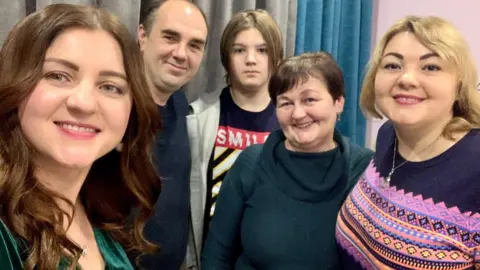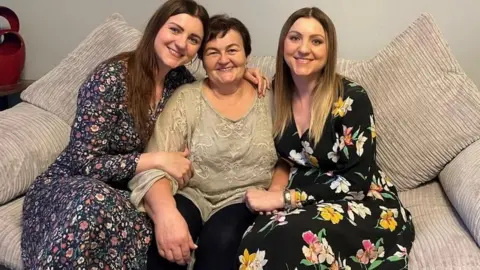Ukraine: 'Being reunited means so much to us'
 Galina Artiushenko
Galina ArtiushenkoA woman says it "means so much" to be reunited with her sister and nephew who fled Ukraine "terrified" as explosions there grew closer.
Marina Korda and son Maxim, who lived in the suburbs of capital Kyiv, are now at the home of Galina Artiushenko in Telford.
Ms Artiushenko said her relatives left the war-torn city by train after Russian troops invaded.
She said it had been a "hard decision", with many other relatives remaining.
"They knew they couldn't take their husband, father, with them so they knew they would have to separate, but it was getting to the point when sitting in the bomb shelters was becoming even more dangerous," Ms Artiushenko told the BBC.
She said Maxim had been "terrified", with explosions getting "closer and closer" to their home.
"You really wouldn't know what to expect next so that is when they made their move," she explained.
She added: "We are all very close as a family and being reunited now means so much to us.
"It is one less worry at the moment knowing they are safe and with me."
The women's mother, Nadia, has also left Ukraine and is staying with Ms Artiushenko's twin sister, Tanya Harvey, who also lives in Telford.
 Galina Artiushenko
Galina ArtiushenkoThe fleeing family used trains to travel into west Ukraine, Ms Artiushenko said, with Mrs Korda praising the national railway which she said had been "determined" to help people get out.
The journey, she said, was nine hours overnight, with many of the passengers "terrified".
Of family remaining in Ukraine, Ms Artiushenko explained: "Some of them are key workers, some didn't want to separate, like leave their partners. Some have got elderly people to look after - they just couldn't leave them."
She added: "Our cousin, she's a doctor, she's a gynaecologist, so she has still been delivering babies at hospital. You can speak to her quite frequently but she is exhausted and the pressure has been extremely hard for her.
"Most people are still out there and it is getting to the point now we are trying to get them out but it is too dangerous."
She said conditions included no electricity, no water and facing cold weather, adding "they are running out of supplies because there is nothing getting into cities".

Follow BBC West Midlands on Facebook, Twitter and Instagram. Send your story ideas to: [email protected]
